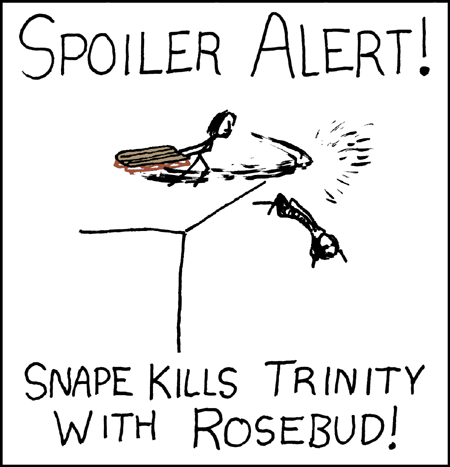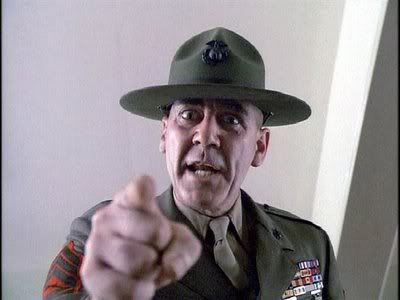I still need a title for the Project. That means I need to talk about The Project. In detail. Seriously, I’ll be talking about when things happen in the plot and possibly even how bits of the story will end. So if you want to avoid even minor spoilers for this EPIC MAGNUM OPUS in progress, or just find yourself unwilling to wade through the following wall o’ text, put your metaphorical fingers in your ears and close your eyes, dreaming about some variation of Trade Wars in your browser courtesy of Yours Truly.

All clear?
Cool.
Chuck over at Terribleminds discusses the ins and outs of titles over yonder. Rather than completely rehash what he wrote, I’m going to tell you to go read it, because that’s the kind of friend I am. And also because he’s brilliant. Not because I fear his beard. Although I kinda do. Seriously, I’m starting to think every manly beard on a friend is concealing another fist or an extra noise-tube full of explatives.
This little exercise is based on his section “Where do I ‘Find’ the title” and deals mostly with the second point he brings up. If any of the half-dozen of you that actually read this drivel want to chime in, it’ll bleed into the first and fourth points as well, like a wordy pool of blood under the corpse of the incredibly generic working title.
Are you sitting comfortably?
Then I’ll begin.
Let’s Talk About Theme, Baby
So this is a fantasy novel.
…
No, that’s the setting.* It’s the where and the how of crap happening. It can’t be the what or why. Theme is less about “what sort of bells & whistles will make people drop $15US on a book with my name on it” and more about “what the hell am I trying to SAY in the next hundred thousand words?” When people ask me what this thing is about, I don’t want to go right into a plot description, I want to actually answer their question. So let’s answer it right now.
This story’s about change. The magocracy** from which our hero hails is about to undergo a pretty big onCONTENT REDACTED The catch is, for hundreds of years the ruling class have suppressed facts about those other societies to better focus their subjects on the development of new and more powerful magical spells. Now, magic here is one of the things that makes this a fantasy novel. I could easily replace magic with mass acceleration technology or rubber band slingshot techniques or guns or taming tigers to serve as mounts in battle. Magic, here, takes the place of technology, and so serves the people in providing mass transit, protection, improvments on quality of life and weaponry.
The way magic is set up in Acradea (that’s the world’s name in case you didn’t know), at least for humans, is that from an early age a given person discovers what school of magic they have a knack for and get trained on that until they’re an adult. Not a lot of dual-classing in the floating Cities of Light, so to speak. Anyway, this means that not everyone can hurl bolts of lightning or turn lead into gold or make you think you’re a dancing pomegranate. However, one of the things that’ll come up over the course of this novel is that several Citizens have collaborated to create a device that allows pretty much anybody to defend themselves at range. The device conjures a small metallic ball at the back of a long metal tube, which is etched with several alchemical sigils called Gravity Wards. They’re what make the flying transit systems work and keep the Cities afloat and they’ve been miniaturized for this. Anyway, each Ward in sequence along the length of the tube makes the ball move, adding a little acceleration each time it passes into the circle of the next Ward. So, by the time the ball leaves the muzzle of the weapon it’s moving faster than the speed of sound.
Yeah, they’re magical mass acceleration rifles. Chocolate, peanut butter, we’re walking…
The novel is less about any potential cool factor of these weapons and more about questions like these: How will these weapons chance the society of the Cities? What was the intention of those designing it, especially considering our hero was instrumental in their implementation? And what happens when an expansionist who controls not only the weapons’ deployment but also the flow of information to the people decides it’s time to get a little payback for the centuries-old incident that drove them into exile from the cradle of their civilization?
That’s the big overarching theme and, I guess, part of the plot as well. There’s also the fact that our hero is dumped in the world outside the Cities’ protective Wall into the big untamed forest/jungle area called the Wilds from the start of the story. So his personal plotline has a fish-out-of-water, coming-of-age theme to it. His brother has something of a quest for vengeance going on, and the girl in the power trio has some prejudices to overcome. Again, I think I’m getting some of my theme & plot elements mixed together, but I hope you can see where I’m going with this yarn.
I’m In The Mood For A Title
Mood ties in with theme pretty importantly as well. And the mood of this is… well, I know the words ‘standard fantasy setting’ have slipped into the common parlance, becoming an indicator of how prevalant escapism has become in modern society (thanks, Yahtzee), but this really is a standard fantasy setting only with more grimdark elements. What elves there are exist either in the Wilds just to avoid getting wiped out entirely (they didn’t begin life communing with the trees or anything) or down in the deepest parts of the world that are habitable. The dwarves live in a police state, ever watchful for signs of Corruption. The dragons are all but unheard of, the giants haven’t been seen in millenia and the humans to the north that exiled the people living in the Cities would rather not have anything to do with anybody south of the mountains.
So everybody’s a little surly towards one another, even moreso than the usual racial tension of the standard fantasy setting. Add to that the mood of the Cities, with a population that is generally happy but a ruling class that is pushing them towards open warfare but couching it in such a way that the people will want a war. It’s totally not a metaphor for modern expansionist thinking, really. It does contribute to the overall mood that this world is a pretty dark place, despite the sunshine and growing green things and sparkly magic and stuff.
Add to that the mostly-serpentine creatures in the Wilds that eat Citizens because magical marrow is tasty and addictive to them, a giant centipede-type thing down under the dwarven mines, necromancy, murder, and just a touch of eldrich abomination from beyond the stars, and I think you can suss out what sort of mood I’m going for.
He’s Gotta Be Strong and He’s Gotta Be Fast…
So this theme and mood are what will propel our hero, Asherian, along the plotlines. He’s an apprentice alchemist, pretty intelligent and willing to get along with people he doesn’t know but somewhat naive and a little too confident in his skills with magic. He was a contributing factor to the Cities’ new weaponry, the son of one of its ruling council members, and pretty much the personification of everything the other socities hate about magic-using humans, at least at first glance. So everybody’s going to be trying to kill him. Part of the drama will come from him just trying to survive, and part will come from the darkening of his otherwise sunny disposition.
The thing that made me want to write more about Ash is that he’s not your generic “Let’s go out and save the world!!1!!” sort of young fantasy hero. For the first third or so of this tale he’s just going to want to find a way home. As things go on and he learns more about what his dad and the other rulers are up to, his goal doesn’t change but his motivations do. It becomes less “I want to go home because it’s dangerous out here and I miss my mom & dad and that’s where all my stuff is” and more “I need to get home because this shit is fucked up and it needs to be fixed.” It’s not that he won’t care about the elves or dwarves or anything, it’s more that he thinks the Cities aren’t living up to what they could really be for the people around them and somebody needs to step up and demonstrate why the rather nasty folk on the ruling council are wrong about wanting to murder anybody who looks at them funny.
And The Title Is…
…Fuck. I still don’t have the foggiest of ideas.
“Cities of Light”? No, the story doesn’t really take place there. It’s sort of about them, but Ash starts out in the Wilds and doesn’t physically get back to the CitiesCONTENT REDACTED.
“Beyond the Wall”? Closer, but it feels so generic fantasy to me. I want this to be about more than just being a fantasy novel, dammit.
“Asherian, His Brother and A Snarky Brunette Travel Across A Continent To Stop The Council of Elders From Being Warmongering Douchebags”?
I think that’s a bit long for most book covers.
Also, ‘douchebags’ might not trend well.
I’m floundering, folks. Send help.
* If you think fantasy is a theme and not a setting, go over here and get that idea out of your brainpan. Seriously. Chuck will chase it out with bullets or flying jets of jism or rabid attack monkeys or something.
** Magocracy is a legitimate word. No, seriously. Gygax coined it first. And you’re not going to question Gygax, are you? ARE YOU?!?








